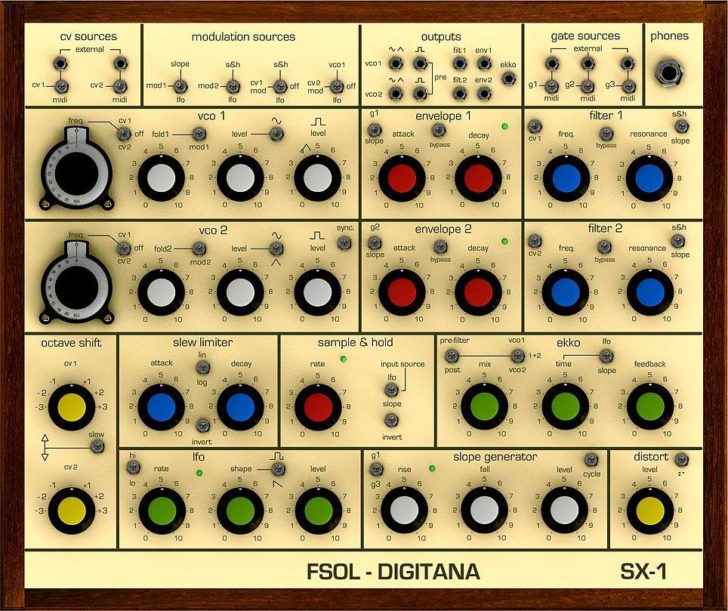
Digitana has announced that the FSOL – Digitana SX-1, a standalone synth expander module, based around the Synthi AKS KS Expander will be available to order starting in June 2018:
FSOL-DIGITANA UPDATE
Having spent considerable time and investment in designing and testing 3 prototype SX-1 units and having gained, in the process, a better understanding of the total costs involved, we are in a position to announce the price of the SX-1 as £3500 +V.A.T
We will start to take advanced orders in June. Information on the procedure for placing an order will be given in due course, either directly to those people already signed up to the email list and also via the FSOL and Digitana Electronics websites.
Please note the initial production run of the SX1 is for 25 units.
The SX-1 shares all the features of the Synthi AKS KS Expander, but requires no Synthi to use it and in addition offers a host of new features.
Video Preview:
See the Digitana site for more information.

Quality and cool module for people who are in EMS synthi style of working, and “affordable” compared to a vintage Synthi A or VCS3. Compared to the Synthi it lacks one oscillator, but has an additional filter (and some minor, less significant details).
One thing I do not understand in this price range: why they haven’t added the pin modulation matrix or at least a bunch of euro patch points on the side, like the $600 Moog M32 has. That’s really a shame.
Now, considering price only, you’ll get much more functionality at comparible mechanical quality, for a nice eurorack.
Now what about the HALia?
I wish Behringer would clone the Synthi AKS for 399,- ………
@WK: Would be very nice. From pure electronics point of view this is very well possible, but when it comes to the controller hardware: knobs, patch matrix, etc you’ll end up near the $3000 area. What they intend to do is bring on the Neutron in the $300 range, and that is a very nice alternative when you’re talking sounds and modulation possibilities.
FSOL… Name inspired by the British band Future Sound of London?
I’ll answer my own question. Taken from Synthi’s website:
“The SX-1 is a ‘stand alone expander’ based around our Synthi AKS KS Expander (described elsewhere on this website). It is the result of ongoing collaborations between Digitana Electronics and the legendary UK band The Future Sound of London. It shares all the features of the Synthi AKS KS Expander but requires no Synthi to use it (though one can of course be used with it) and in addition has a host of new features described below.”
FSOL have a history of expander-related activity https://youtu.be/UEPGLQAoNFc
With such a price tag why not looking into producing the unit elsewhere? For instance East Europe where it’d be cheaper to build for sure and quality wouldn’t be an issue. Cheaper product would attract more customers and make more profit.
4000€ + vat
ok, Im not interested anymore.
A run of only 25 for a gob of money that large per unit is just a vanity project aimed at boutique collectors. There’s a good reason that you can buy several flavors of VCS3 in software. Behringer may or may not make a clone, but as prone to crosstalk as that original pin matrix could be, it seems far better served as an app. Its always been far more of an “effects synth” than a traditional keyboard. Get it for your iPad and don’t sweat it.
The iPad version running through a Babyface Pro sounds killer btw.
@Tom Slowcat. That’s the first thing that came to my mind as well, so you’re definitely not alone: Papua New Guinea + LIFEFORMS totally popped into my mind. Further research turned up a demo provided by FSOL that sounded eerily like the latter album.
For that price it only comes with only two attack-decay envelopes? Analogphiles who are willing to pay that kind of money make me laugh.
How are the filters routed? Series or Parallel? (I love the Waldorf’s super simple solution to giving you both & everything in between!
Pricing of this relative simple analog syth is very high. Why would you buy some thing like this, there are some many more modern offerings for your money. It’s cool that there are smaller company’s make other products but this way it just ends up in the hands of collectors. Why go to the effort of making a instrument only a few can enyo.
Not every creative product is aimed at the mass market. And that’s a good thing.
Not every product designer aims for mass market acceptance, and that’s a good thing.